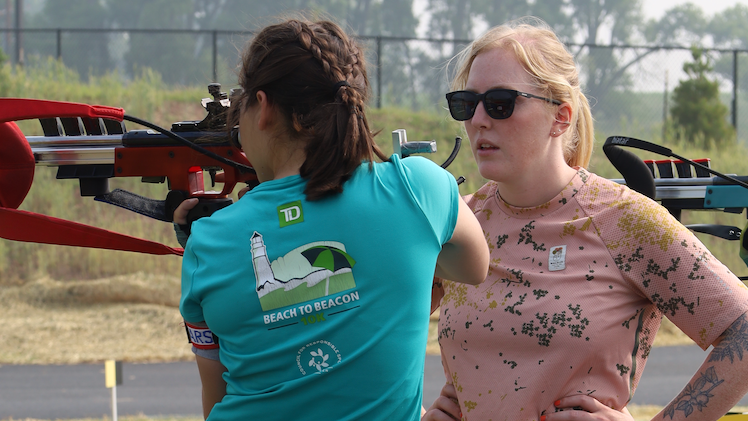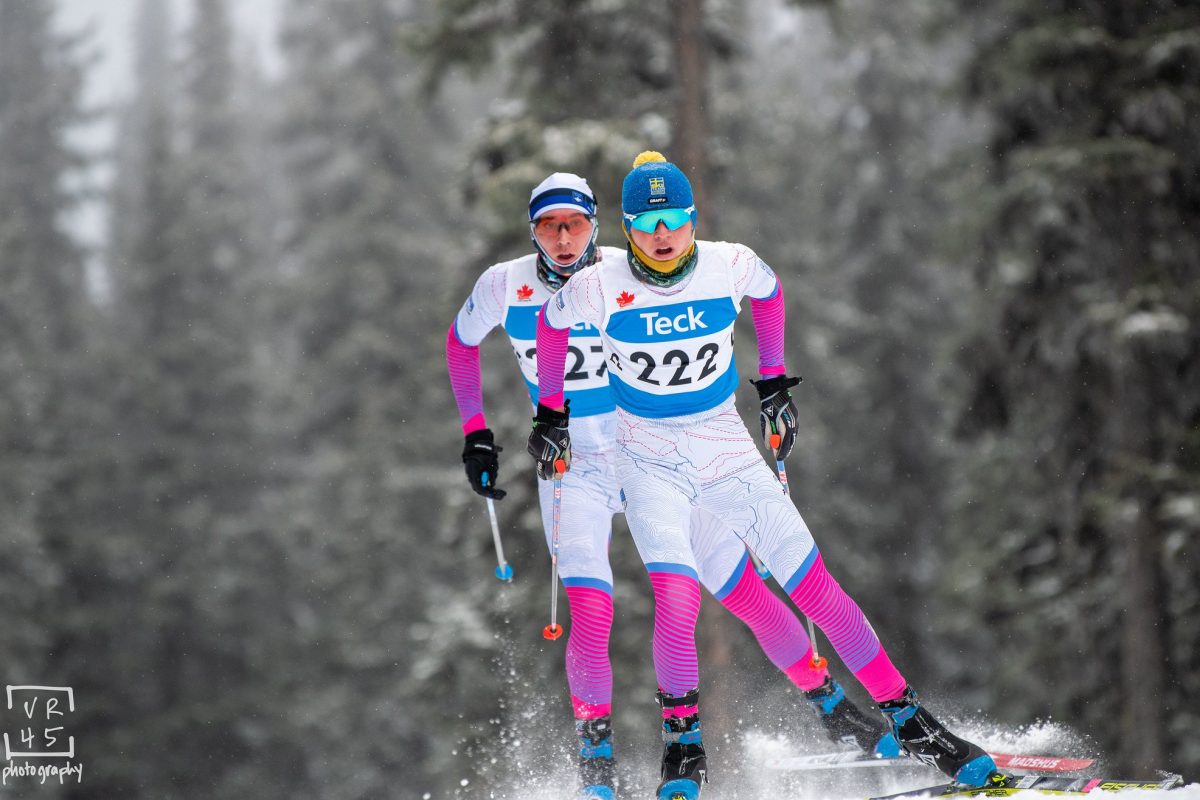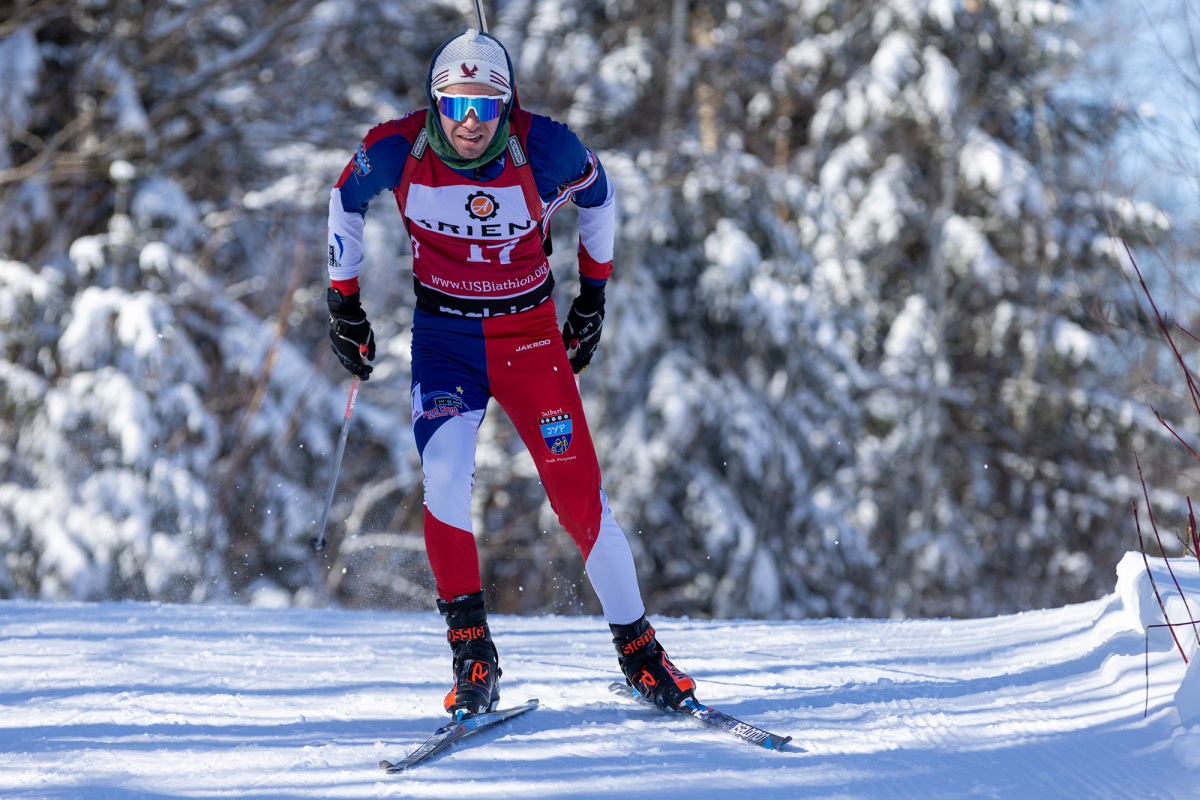
JERICHO, Vermont – Just how excited was Jean-Philippe Le Guellec to make the drive from Quebec, Canada, down to Vermont this weekend for the North American Rollerski Biathlon Championships?
“Let me put it this way,” he said. “I was supposed to go on a fishing trip this weekend and I ended up cancelling on my friends because I was so happy that Tim [Burke] and Lowell [Bailey] were here. These guys are in the top at the World Cup and I think that it’s nice that in North America we have that kind of performance.”
If anyone would appreciate this sacrifice, it’s Burke and Bailey, who are fishing enthusiasts themselves. And Burke was similarly enthusiastic about the chance to compete against Canada’s top biathletes.
“I didn’t realize that they were coming down actually until I saw them yesterday,” Burke admitted. “But it’s great that they come down. I time trial against everyone else here pretty often in the summer, so it’s really nice to have some new faces, especially ones of that caliber.”
Le Guellec made the most of his trip, winning Saturday’s 10 k sprint race by ten seconds over U.S. National Team member Leif Nordgren despite having two penalties to Nordgren’s one – which seemed to surprise him.

“Skiing felt horrendous,” he said after cooling down from the sprint. “During the race I thought that Tim was right ahead of me in bib numbers, so when I got on the range in prone and saw that he wasn’t even there it was like, ‘oh, my God.’ I forgot that he was three bibs ahead. If I had caught him, that would have been a problem for Tim! But still, skiing didn’t feel so great.”
In Sunday’s four-stage, 12.5 k pursuit, the tables were turned, with Burke starting 18 seconds behind Le Guellec. On the first prone stage, Le Guellec missed two shots to Burke’s one, setting up a showdown that lasted the rest of the race. Both men cleaned the second prone, and then collected one and two penalties in the pair of standing stages. At the finish, Burke edged the Canadian by just a single second.
“It’s really motivating,” Burke said on Saturday of having the Canadians around. “There’s no substitute for putting on the bib.”
Nordgren, like Burke, had five penalties in the pursuit; although he cleaned the first stage, the late misses dropped him to third place. But it was still a strong showing for the youngest man on the national team – and an important one, if he wants to race on the World Cup this winter. Several of the top U.S. athletes are pre-qualified to a training camp in Sweden before the opening World Cup races, and Nordgren is vying for one of a few remaining open spots that will be decided based on this weekend’s races and two time trials in Utah this fall.
“These races matter for me!” he told FasterSkier. “I have to qualify here. I’m not taking them too seriously, but it does feel nice.”
Nordgren was enthusiastic about his single penalty on Saturday, and particularly the fact that he had cleaned in prone, which he says is usually he weaker position. But like Le Guellec, he didn’t think that his skiing was spectacular.

“The skiing didn’t feel so well – I just tried to stay pretty even, I guess,” Nordgren said. “I didn’t have a lot left to push on the last loop, but I didn’t push that hard on the first or second, either. So it was kind of mediocre skiing, but it worked out well for shooting. I came in fairly recovered for both standing and prone.”
In Saturday’s sprint, there was a gap of almost 50 seconds to fourth-place Ethan Dreissigacker of Craftsbury, Dartmouth College, and the Ethan Allen Biathlon Club. But he was followed closely by Bill Bowler, an American who is training partly with the Biathlon Alberta Training Center, in fifth, and national team and Maine Winter Sports Center athlete Russell Currier, who was sixth. The three men started the pursuit separated by just one second, with U.S. national team racer Lowell Bailey another three behind them.
And while Bowler dropped back, slowed down by penalties, it was an exciting race til the end for the other three. With Dreissigacker collecting six penalties to the seven by Bailey and Currier, he had a much-needed upper hand. Dreissigacker snagged fourth place again, and once again it was by one second, this time over Bailey.
It was the first weekend of senior racing for Dreissigacker, who is entering his senior year at Dartmouth and had a top finish of 20th in the sprint at last season’s World Junior Championships in Kontiolahti, Finland.
“I shot a lot better than I’ve been shooting in training lately,” Dreissigacker said.
As for whether he’ll focus on biathlon this year, he said his plans were “all up in the air.” He was interested in making a trip to Open European Championships, but doubted that he would spend a significant amount of his winter traveling. With only a year left of school, Dreissigacker wants to finish. As such, he’s been doing “mostly skiing training” this summer.
After a weekend in Jericho, the biathletes were exhausted, but pleased.
“It’s tough,” Burke said on Saturday of the annual rollerski championships. “It seems like at Jericho we always get some sort of extreme weather, and it was really hot today, which made it pretty tough… and we don’t really take a break for these first races, we train right through it and it’s a little tough. You’re always a little more fatigued. But you feel that way in the winter sometimes too, so it’s good to be prepared.”
Le Guellec was going home happy, too.
“Jericho itself, it’s so nice to rollerski here – it’s like skiing in the winter,” he said. “And it’s fun to see all the young people. It’s North America at its best… I’ll be retired in two years, so I’ll go fishing every weekend after that.”



